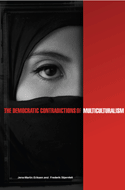By Telos Press · Monday, May 6, 2013 Save 20% when you purchase at telospress.com
 The Democratic Contradictions of Multiculturalism, by Jens-Martin Eriksen and Frederik Stjernfelt, is now on sale in the Telos Press store. Purchase it here and save 20% off the list price! The Democratic Contradictions of Multiculturalism, by Jens-Martin Eriksen and Frederik Stjernfelt, is now on sale in the Telos Press store. Purchase it here and save 20% off the list price!
What is multiculturalism? Is it every person’s right in a democratic society to choose his or her religion and culture and to express criticism regardless of taboos and moralistic norms? Or is it the right of cultures and religions to be protected from insult and to preserve themselves against change? Jens-Martin Eriksen and Frederik Stjernfelt examine the ideology and the reality of multiculturalism, including the Muhammad cartoons, laws against blasphemy, hijab, the Islamic ban on apostasy, and the limits of the freedom of religion.
Continue reading →
By Göran Dahl · Friday, October 12, 2012 Jens-Martin Eriksen and Frederik Stjernfelt’s The Democratic Contradictions of Multiculturalism, reviewed in this essay, is available for purchase here.
I cannot refrain from first saying that this is a must read-book. That goes for those who are critical of “multiculturalism”—whatever this means—and for those wanting to defend it.
 Let us begin the central concept in this book—multiculturalism. I have, when confronted with the word, been wondering if the one who utters it is referring to an ideological ideal or a state of affairs. The authors use a similar distinction: multiculturalism is confusing since it is often not clear what is meant. It can be either an existing condition or a coming condition. This kind of use is descriptive. Then we have the normative one: a necessary way to think and act in a society when we have different (most often) ethnically based communities with different ideas on what is right or wrong. Just remember the Danish Mohamed cartoons from some years ago, and now recently the short film ridiculing “the prophet” available on YouTube. All of this has led to a discussion of whether there should be limits on free speech that involves ironies, jokes, pictures, etc., that could make religious believers feel insulted. The objection of many others, including me, is that in a modern, western liberal democracy one can say or illustrate any religious matter in whatever way you want. The public sphere is totally secular, or at least it should be so.[1] If you feel insulted, this is a private reaction, outside the public sphere. The bottom line would then be very simple: the public sphere gives anyone the right to argue his or her opinion, while civil society is the sphere of emotions. As long as these emotions remain just emotions, there is no problem. But the reason why this is an important book is that we have seen the emergence of leaders in the west who have considered limitations regarding free speech so that no minority gets insulted. If we follow this logic to its conclusion, then cartoons illustrating stereotypes of men, for example, should also illegal. A related problem is self-censorship, which many modern writers and artists have admitted suffering from. So the problem starts to get very complicated. Let us begin the central concept in this book—multiculturalism. I have, when confronted with the word, been wondering if the one who utters it is referring to an ideological ideal or a state of affairs. The authors use a similar distinction: multiculturalism is confusing since it is often not clear what is meant. It can be either an existing condition or a coming condition. This kind of use is descriptive. Then we have the normative one: a necessary way to think and act in a society when we have different (most often) ethnically based communities with different ideas on what is right or wrong. Just remember the Danish Mohamed cartoons from some years ago, and now recently the short film ridiculing “the prophet” available on YouTube. All of this has led to a discussion of whether there should be limits on free speech that involves ironies, jokes, pictures, etc., that could make religious believers feel insulted. The objection of many others, including me, is that in a modern, western liberal democracy one can say or illustrate any religious matter in whatever way you want. The public sphere is totally secular, or at least it should be so.[1] If you feel insulted, this is a private reaction, outside the public sphere. The bottom line would then be very simple: the public sphere gives anyone the right to argue his or her opinion, while civil society is the sphere of emotions. As long as these emotions remain just emotions, there is no problem. But the reason why this is an important book is that we have seen the emergence of leaders in the west who have considered limitations regarding free speech so that no minority gets insulted. If we follow this logic to its conclusion, then cartoons illustrating stereotypes of men, for example, should also illegal. A related problem is self-censorship, which many modern writers and artists have admitted suffering from. So the problem starts to get very complicated.
Continue reading →
|
|
 The Democratic Contradictions of Multiculturalism, by Jens-Martin Eriksen and Frederik Stjernfelt, is now on sale in the Telos Press store. Purchase it here and save 20% off the list price!
The Democratic Contradictions of Multiculturalism, by Jens-Martin Eriksen and Frederik Stjernfelt, is now on sale in the Telos Press store. Purchase it here and save 20% off the list price! 

